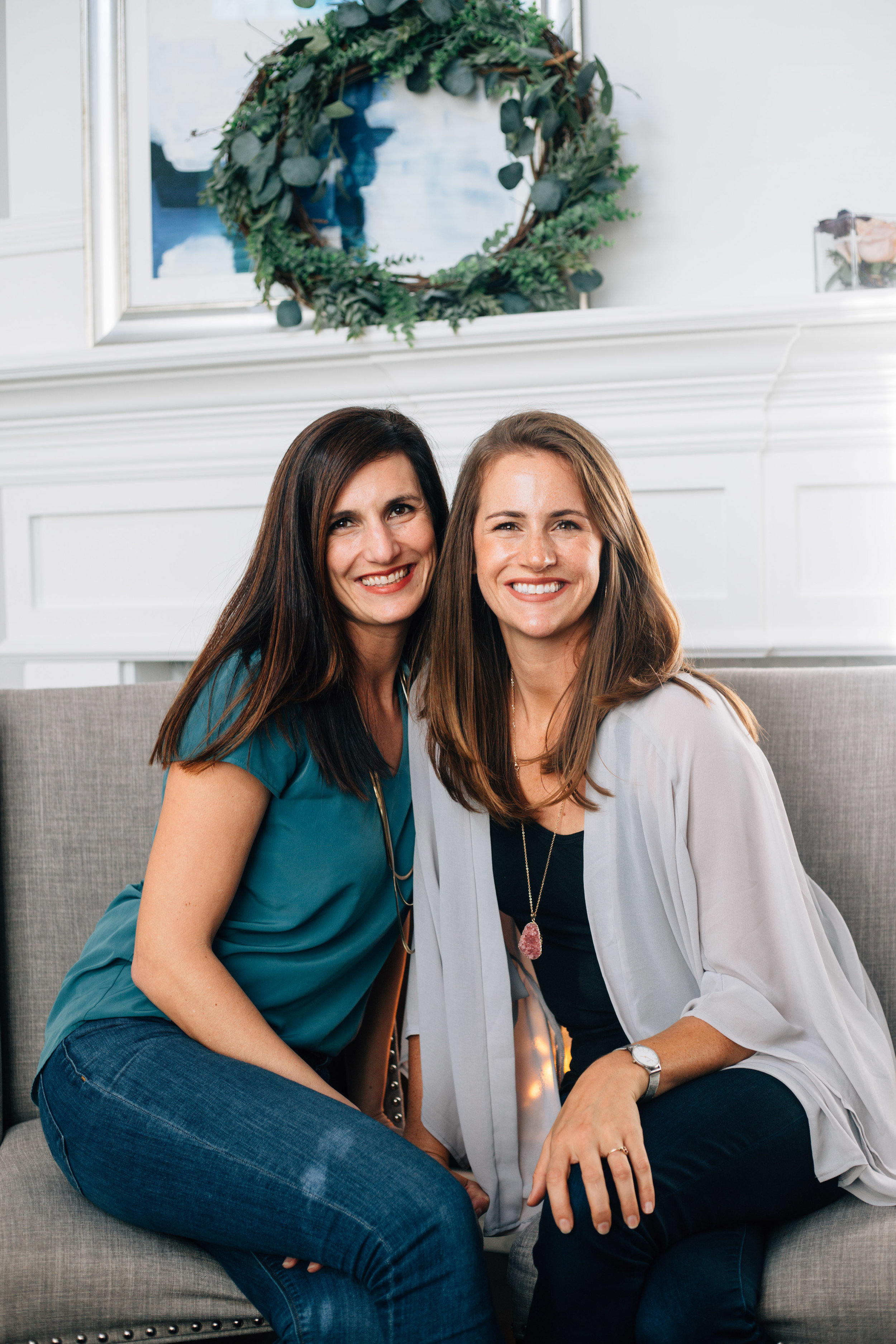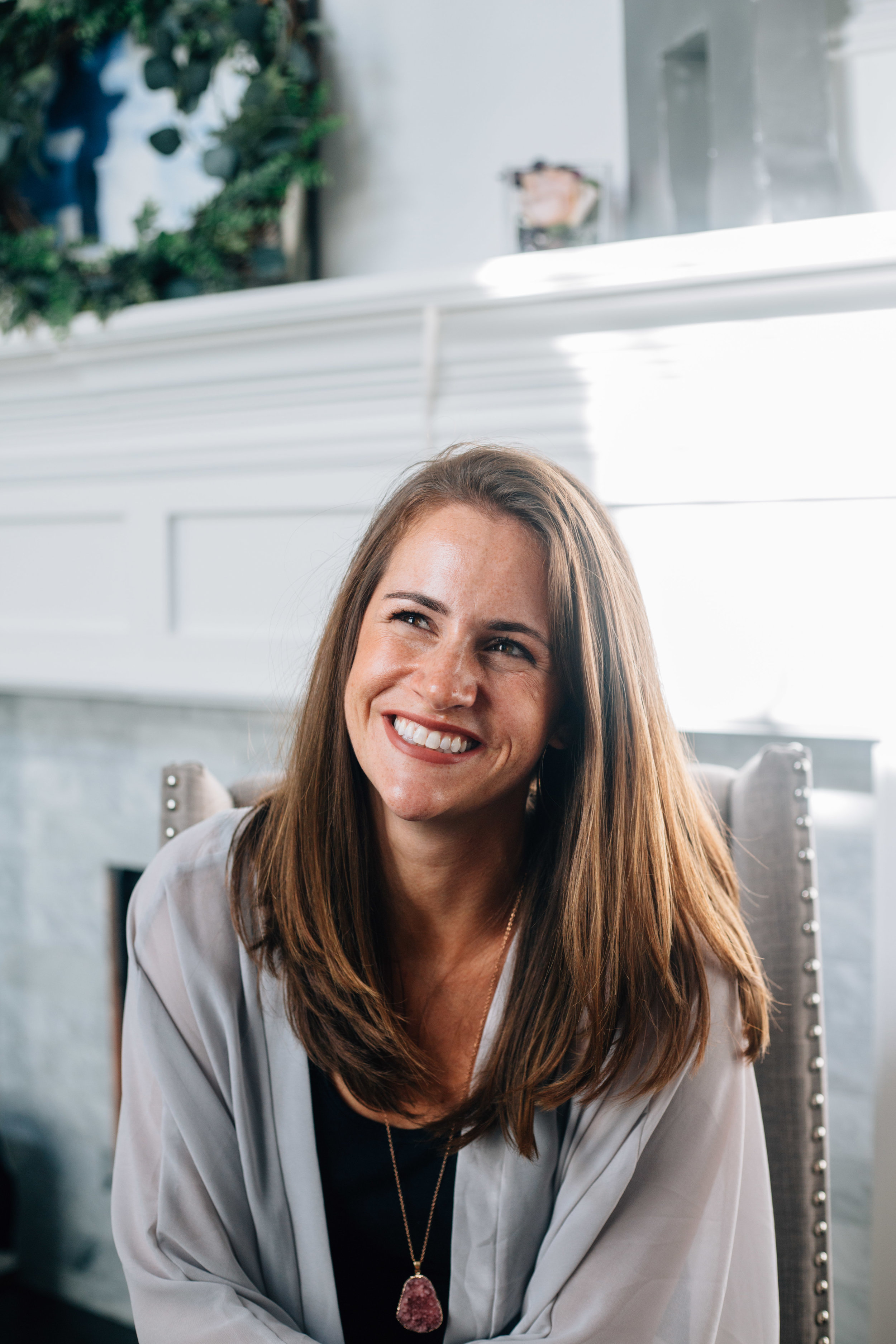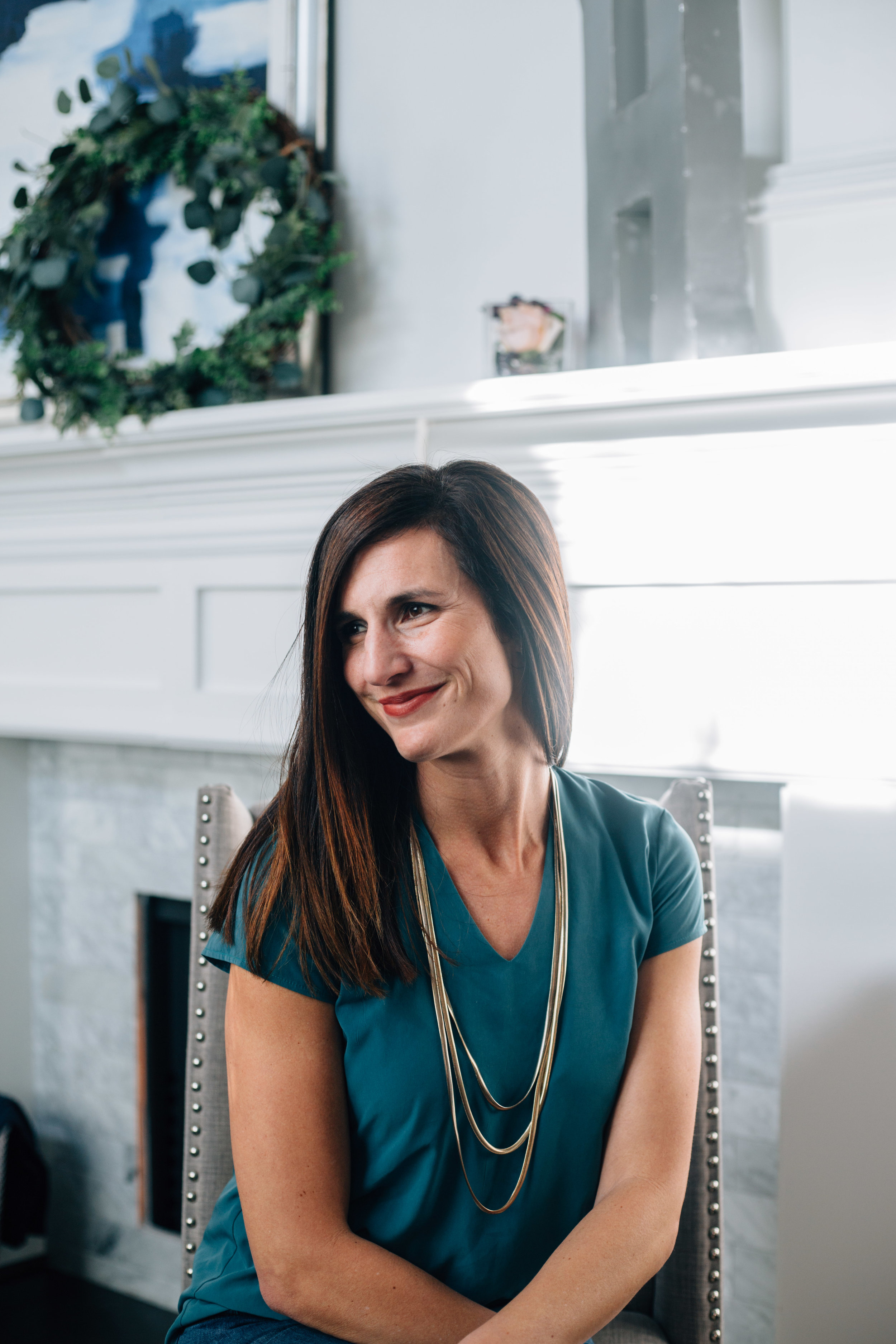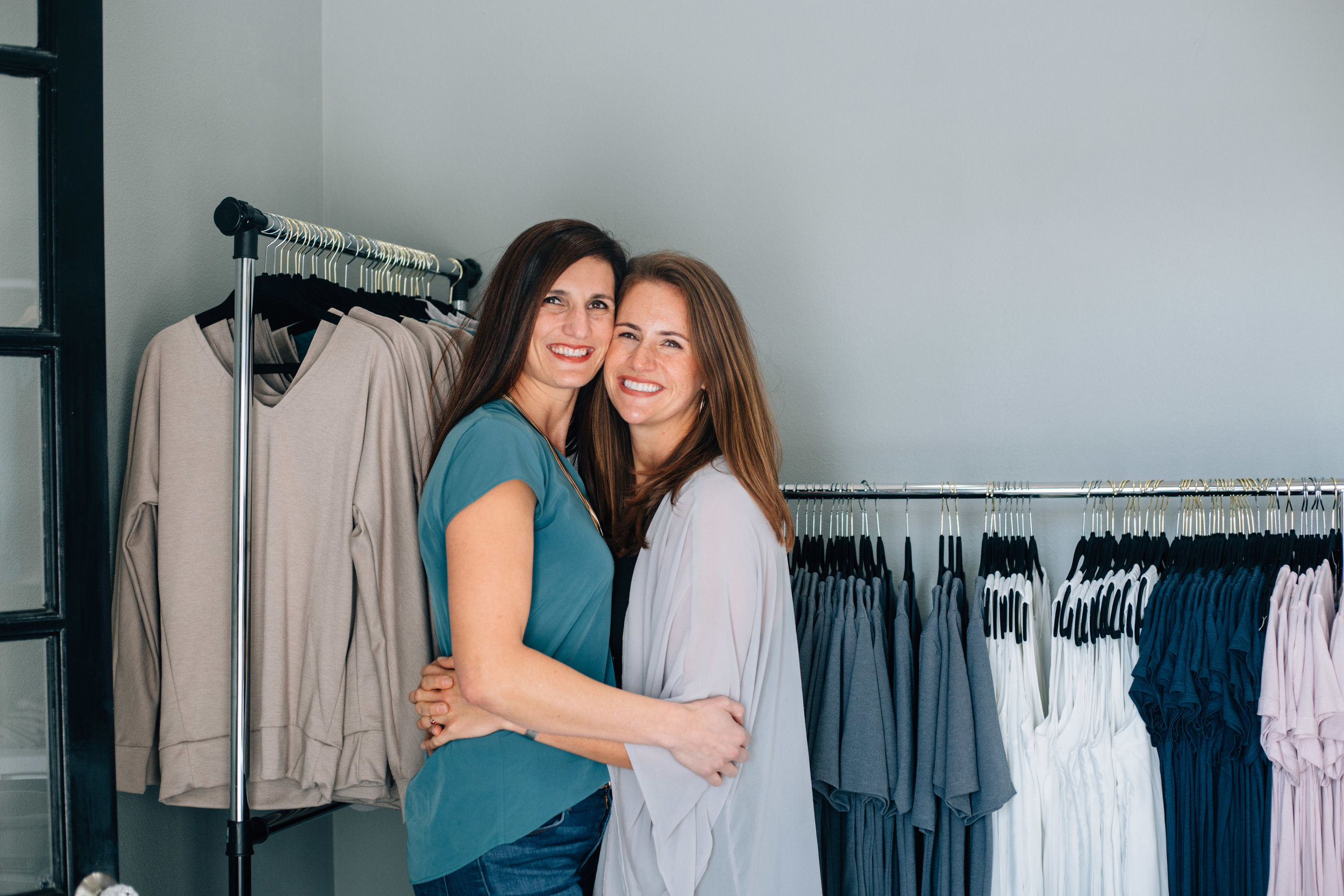About a year ago, two sisters living on different continents talked on the phone about a pair of boots.
“They’re a little expensive,” Kimberly Brune reasoned from her home near Capetown, South Africa. “But isn’t it worth it to buy something quality from a brand with good practices?”
From McKinney, Texas, Kate Heihn agreed. When she encouraged her sister to buy the boots, Kimberly did.

Kate and Kimberly of Brookes Collective.
For many of us the conversation might stop here, but Kate and Kimberly found their frequent phone calls turning into discussions about sustainable clothing, fair trade fashion practices, and ethical awareness in manufacturing. Kate has a background in social work, and Kimberly is a missionary in South Africa working to counter human trafficking. With their experience, they are well-aware that the global fashion industry is one of the biggest supporters of human trafficking and modern slavery.
In our world of fast fashion, sale chasing, and one-time-wear clothing, the mission-minded sisters committed to filling their own closets with brands that value human life and work toward sustaining our planet. Only one question remained. How would they ever afford it?
We may never know who came up with the concept of Brookes Collective; both Kate and Kimberly take credit for it. When they realized that they shouldn’t have to decide between buying affordable, beautiful clothes and valuing human life, they decided to launch a fair trade clothing line themselves.
After a quick Google search for “How to start a company,” Brookes Collective was born.
My interview with Kate and Kimberly takes place in the Brookes Collective US headquarters, Kate’s living room in McKinney. Kimberly is at the tail-end of her visit from South Africa; she flew to Dallas for the official Brookes Collective launch party where they debuted the 2019 Spring/Summer line. Their fair trade, capsule wardrobe line includes two dresses, a skirt, a kimono, a jumpsuit, and a variety of shirts, basics, and jewelry. Both women are wearing the Brookes Collective clothing they designed.
“We work very well together,” Kate says. “Kimberly is very big picture, and I’m very small picture.” Between the two of them, they explain, they have been able to sustain both the big vision of the brand and the small details needed to make it happen.
That big vision includes the goal of transforming our systems, culture, and conversations around fashion. Brookes Collective is working to not only create sustainable, fair trade wardrobes, but also to educate consumers to be mindful of where their clothes come from and where they end up.
The small details needed to produce a clothing brand accumulate quickly. Kate and Kimberly needed to figure out design, materials, manufacturing, distribution, and marketing. And, they needed to figure out how to do it in a way that was true to their mission of creating beautiful clothing while treated their artisans with dignity and respect.
“If it were just me alone,” Kimberly says, “we’d be $100,000 in debt.”
“And if it were just me alone,” Kate replies, “we’d still be dreaming about it.”
To make any progress, Kate and Kimberly had to embrace a “we can figure it out” attitude. From Texas and South Africa, they got to work learning all they could about designing and manufacturing a clothing line.
One major piece of their business clicked into place when Kimberly sat in a coffee shop in Cape Town. Just as she was running out of questions to type into her Google search bar, she leaned over to a woman at another table and asked, “Do you know anything about fair trade manufacturing?”
“Do you know what’s funny?” the stranger responded. “There’s a place right down the road called Sparrow Society who might do it.”
As it turned out, Sparrow Society is a nonprofit manufacturing company committed to creating great products, developing employees with training and skills, and paying them a living wage. While they had never manufactured clothing before, the founder assured Kimberly that they could “figure it out.” Sparrow Society became the official manufacturer of the Brookes Collective Line.
A prominent part of the Brookes Collective identity is that all its clothing is manufactured in South Africa — the country where Kimberly has spent more than 10 years of her life working to counter human trafficking.
“South Africa is called the ‘Rainbow Nation,’” Kimberly explains. “It has every global issue and every justice issue– lack of water, lack of food, lack of employment. If we can create it there, we can make it everywhere.”
Kimberly continues, “For a developing country to enter into manufacturing can be a huge step. With Brookes Collective, I think what’s most exciting to me is both about tearing down systems and creating new ones.”
Kimberly understands a lot about the systems in place in South Africa, especially as they pertain to human trafficking. “The UN definition of human trafficking is ‘tricked, trapped, and used,’ Kimberly explains. “A lot of times when we think about human trafficking, we think of sex slavery. What we see even more often, though, is people being tricked and trapped. It looks like this: ‘Here’s a good job. Come down from Zambia. I’ll pay you Friday. Now you’re here illegally, I own your visa, and you owe me.’”
Through their partnership, Brookes Collective and Sparrow Society offer sustainable, living wage employment to nine new artisans, seven of whom have been “up-skilled,” like the design manager who is now a new product developer. To ensure their products are ethically produced, they put significant thought into their employees’ experience and work environment. They make sure their artisans have enough breaks, enough light, and good access to transportation.
“If you are valuable,” Kate says, “your work is valuable because you created it. We want to put people in a position to create important things. We’re not just here for the label; we are here for the people. When we talk about fair trade, we mean people are employed, paid a living wage, and treated with dignity and respect.”
Kimberly adds, “We are so proud of who our people are. We appreciate our artisans, and they are secure. They are no longer counted as a vulnerable people group. They are showcasing to the entire world that South Africa can do this–we can make great things.”
Consumer education is just as important as ethical production to Kate and Kimberly. “If we don’t know there’s a problem,” Kimberly says, “we won’t change our habits.”
“From the very beginning,” Kate adds, “we wanted to educate our consumers. It’s ingrained in us as a culture to not ask the questions about where our clothes come from, but to look for the sales. We buy a shirt, even though we know it might only last a season or a couple wears because it’s so cheap. It’s not so easy to justify if you know it was made by a little boy who was trafficked. At Brookes Collective, we want to humanize the process. We want to be a part of the #whomadeourclothes movement, and we want people to know their manufacturers.”
For the fashion industry, manufacturing practices aren’t the only problem Kate and Kimberly are committed to addressing.
“The average piece of clothing is only worn three times,” Kimberly says. “The average American throws away over 80 pounds of garments per year, and much of that waste is plastic because of the materials in our fabrics.”
Through the Brookes Collective blog and social media pages, Kate and Kimberly share “less is more” styling tips for their capsule wardrobe. They encourage consumers to own a few beautiful, interchangeable items that they can style in different ways rather than purchase once-wear clothing.
In the Brookes Collective fall line, Kate and Kimberly are introducing some farm-to-closet pieces; they can track the production of their materials all the way back to the source. The fabrics they’ve chosen have 70% natural fibers from South Africa.
Kate and Kimberly are both moms; they have five daughters between the two of them. At the end of our interview, Kate’s three girls burst through the front door and run up the stairs. In a giggly blur, they run right past Kate’s office, the Brookes Collective distribution center. It’s lined with neat hanging racks, stacks of folded shirts, and organized bins of mailers. The line has officially launched.
The goals at Brookes Collective are big and altruistic. For two women who had no background in fashion and had to Google “How to start a business” just a year ago, they’re making strides to address important, systemic global issues in the fashion industry. Brookes Collective is even working to incorporate the words “Fair Trade” into new cotton industry legislation in South Africa.
On the Brookes Collective blog, Kate and Kimberly have written posts titled, “Female Empowerment for the Next Generation” and “Why is Fashion a Women’s Rights Issue?”
In one blog post, Kimberly summarizes the Brookes Collective journey over the past year:
“Even if we fail, our girls will see their mamas doing something brave. We are still a small start up, and Kate and I are learning every single day through things that work and don’t work. However, this is absolutely true, this is worth doing.”
To #choosebeauty with Brookes Collective, follow them on Instagram @brookescollective, where locals can learn about DFW pop-ups and Brookes Collective events.
If you know someone who is Doing Good in Dallas, we’d love to hear about it! Share their story with us.
Story by Liz Navarro. Photos by Hunter Lacey.


